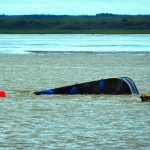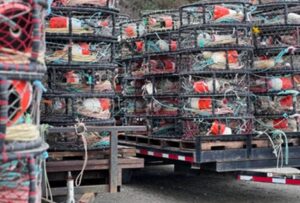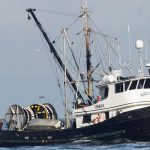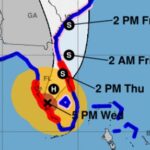Tag Archives: Congress

Oceana’s Challenge to Bycatch Rule Looks Likely to Sink
The D.C. Circuit appeared primed Monday to uphold how the government counts bycatch — a term for various sea life unintentionally swept up in commercial fishing. Led by the nonprofit Oceana, the challengers take issue specifically with procedures by which the National Marine Fisheries Service monitors for bycatch with less intensity than Congress allowed it. The agency came up with a new procedure to cover the Greater Atlantic region three years ago after a plan from 2008 was found to have improperly given the agency “complete discretion” to depart from procedure. >click to read<09:05
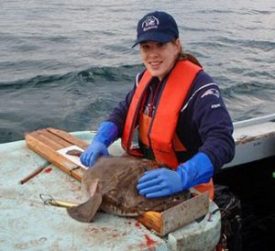
NOAA/NMFS to Reimburse Sector At-Sea Monitoring Costs
NOAA/NMFS will pay for all at-sea monitoring costs for fishing year 2018. Any groundfish sector trip beginning on or after May 1, 2018 that was selected for at-sea monitoring coverage is eligible for reimbursement. NOAA will also reimburse industry for an additional 25 percent of their at-sea monitoring costs in fishing year 2017 using remaining prior year funds, bringing the total reimbursement for 2017 to approximately 85 percent. This reimbursement was provided for by Congress through an FY18 funding increase for groundfish at-sea monitoring. >click to read<12:54

Senators question NOAA Fisheries-FWS merger proposal in hearing
Members of the U.S. Senate got their first chance to look at the latest attempt to merge NOAA Fisheries with the Fish and Wildlife Service at a meeting on Thursday, 19 July. ,,,“Moving NOAA Fisheries from (the Department of) Commerce to the Department of Interior ignores the agency’s responsibility of managing multi-billion-dollar commercial fisheries,” said Cantwell, who added that she believes what fisheries need is “science and funding.” A merger of the two agencies requires approval of the U.S. Congress. >click to read<17:11
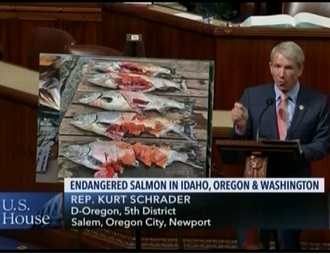
Congress must choose threatened salmon over sea lions
State, federal and local governments have spent too much time and money restoring fish runs in the Columbia River Basin to let those efforts go to waste. The U.S. House recognized this reality last month by passing legislation to make it easier to kill sea lions that feast on threatened salmon and steelhead in the Columbia River and its tributaries. Now, the Senate must step up and push the bill through to the finish line. Northwest senators must be unified in their support for this common-sense measure, which aims to safeguard the billions of dollars invested in preserving fish that are listed under the Endangered Species Act.>click to read<
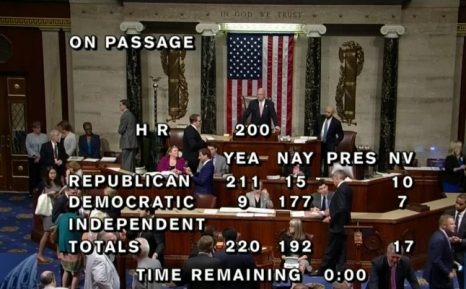
Opinion: Fisheries act is a chance to build trust
There’s a little something for everyone to hate in the House’s proposed renewal of the Magnuson-Stevens Act. Commercial fishermen feel it gives too much to recreational fishermen and environmentalists. Recreational fishermen say it goes too easy on their commercial counterparts, and the environmental lobby says the measure, which passed the House last week along largely partisan lines, will undo years of progress in restoring fish stocks. We are left with what we have had for decades — a pitched battle among competing interests, with no end in sight. Congress must do better to help guarantee that the science behind management decisions is sound and easily understandable. >click to read<19:25
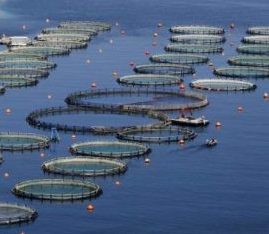
Hundred organisations opposes industrial ocean fish farming
More than a hundred organisations have formally announced their united opposition to industrial ocean fish farming in U.S. waters. According to Friends of the Earth, the move comes as some members of Congress are attempting to force through legislation to develop offshore fish farming nationwide. In a letter to members of Congress, the broad coalition representing a wide range of interests, including commercial and recreational fishing, indigenous populations, consumer advocacy, food, farming and conservation, called on legislators to protect oceans from development of marine finfish aquaculture off U.S. shores. >click to read<08:59
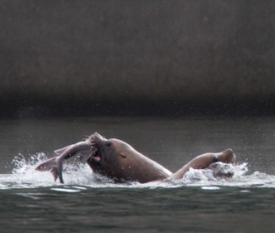
In their battle against sea lions, fish are losing – Support The Endangered Salmon and Fisheries Predation Protection Act
The tally doesn’t look good for steelhead and salmon on the Columbia River. Last year, sea lions devoured an estimated 9 percent of steelhead and 5 percent of spring chinook trying to make their way upstream past Bonneville Dam. Even more disconcerting, an estimated 24 percent of chinook disappeared between the mouth of the Columbia and the dam. In other words, there is a battle going on in the Columbia, and the sea lions are winning. That points out the need for Congress to pass a bill sponsored by Rep. Jaime Herrera Beutler, R-Battle Ground. >click to read<12:53
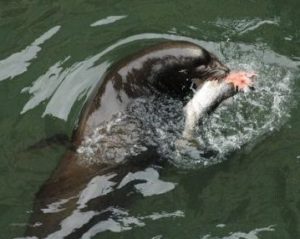
Congress must act — again — to save salmon from hungry sea lions
Government agencies spend hundreds of millions of dollars annually trying to preserve threatened salmon and steelhead runs in the Columbia River Basin. Yet in recent years, a growing population of hungry sea lions has jeopardized all of that investment and hard work.,, Congress needs to safeguard the public’s investment in conserving these vulnerable salmon and steelhead runs along the Columbia. Republicans and Democrats must come together this year to pass legislation making it easier to lethally remove some of the sea lions. That will mean relaxing a section of the 1972 Marine Mammal Protection Act,,, >Click to read<11:34
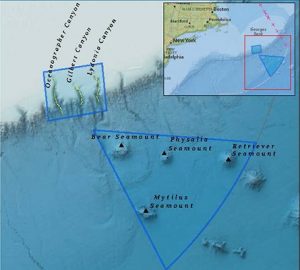
If courts are ever going to strike down an illegal national monument, this’ll be it
Often, it seems the federal government has it out for the English language. The President and federal agencies routinely twist the words in statutes beyond recognition. For instance, PLF has long challenged EPA’s bizarre claim that dry land is “water” under the Clean Water Act. The government’s no fan of consistency, so it should come as little surprise that the President also claims the ocean is “land” when that suits his purposes. In Massachusetts Lobstermen’s Association, et al. v. Ross, PLF is challenging the designation of 5,000 square miles of ocean as the Northeast Canyons and Seamounts Marine National Monument, under a statute that expressly limits designations to “land owned or controlled by the Federal Government.” The government has moved to dismiss that case arguing that the President can essentially do whatever he wants, the language of the statute be damned. Today, we filed our response to that motion. In our brief we explain that: Pacific Legal Foundation >click to read<21:52
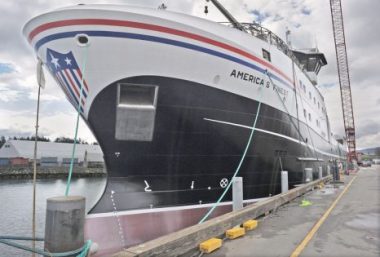
No rescue by Congress for $75M fishing boat in Anacortes that can’t fish in U.S. waters
A state-of-the-art $75 million factory trawler moored at an Anacortes dock is called “America’s Finest,” but that name could end up being a cruel irony for the shipyard and fishing company that hoped to put it to work. The still-unfinished vessel is not allowed to dip a net in U.S. waters because the hull contains too much steel modified overseas. A congressional waiver to overcome that failed to make it into the $1.3 trillion spending bill signed Friday by President Donald Trump. Mike Nelson, vice president of Dakota Creek Industries Anacortes, said the failure to gain >click to read<22:59

NEPA: Taming The Environmental Beast That Was Meant To Be A Watchdog
What was first proposed by Congress as a modest law to assess the environmental impact of highway construction and other publicly owned projects, has grown into a bureaucratic monster, the likes of which no one ever imagined. Nearly a half-century ago, before major federal environmental laws existed, Congress wanted to ensure that all federal agencies consider the environmental impact of their actions. This well intended action led to passage of the National Environmental Policy Act (NEPA). However Congress didn’t envision how a seemingly modest watchdog law would become the regulatory monster that it is today. >click to read< 14:49
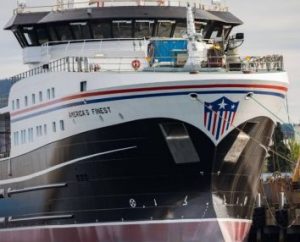
Anacortes delegation travels to Unalaska
Visitors from Anacortes, Wash., traveled to the Aleutian Islands last week to urge the Unalaska City Council to stop asking the U.S. Congress to restrict a stranded factory trawler from buying cod at sea. Earlier, Unalaska Mayor Frank Kelty sent the state’s congressional delegation a letter urging “sideboard” restrictions on any Jones Act waiver granted to the new factory trawler America’s Finest. The vessel ran afoul of federal domestic content law when it was discovered it had excess foreign steel in its hull. Now, the state-of-the-art $74 million flatfish factory trawler can’t fish in the U.S., unless Congress grants a waiver. >click to read< 12:531

California’s crab fleet awaits share of $200 million in disaster relief
The North Coast fishing fleet has welcomed some rare good news out of Washington, D.C., where the congressional budget deal reached last week included disaster relief funds intended to offset losses from the ill-fated commercial Dungeness crab season of three years ago. But just how much help may be on the way is uncertain and could remain so for some time. There’s bureaucracy involved, and the wheels of government often turn slowly for fishermen seeking aid. >click to read< 17:57
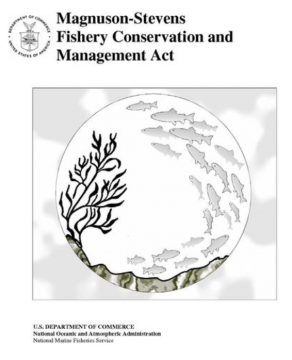
HR 200 – 24 Fishing Groups from Around the Nation Call for Magnuson-Stevens Act Reforms
Twenty-four members of Saving Seafood’s National Coalition for Fishing Communities (NCFC) are calling on Congress to enact broad reforms to the Magnuson-Stevens Act (MSA), including allowing for greater flexibility in how stocks are rebuilt and changes to how new management programs are implemented. The proposals, delivered in a letter to Alaska Senator Dan Sullivan, would, according to the signers, lead to a reauthorization that “allows for both sustainable fisheries management, and the long-term preservation of our nation’s fishing communities.” >click to read< 13:22 

Congress passes spending bill after brief government shutdown
Congress approved a $300 billion, two-year spending bill and an additional $90 billion in aid for victims of hurricanes and California wildfires early Friday and President Trump signed it, ending a brief partial shutdown of the federal government.,,, of interest, tucked in the bill is $200 million for nine declared fishery disasters from Alaska to California dating to 2014. Reps. Jared Huffman, D-San Rafael, and Jackie Speier, D-Hillsborough, have been urging approval of funds to aid fishermen affected by the 2015-16 closure of the Dungeness crab season and several salmon fisheries going back to 2014. The administration would decide how to allocate the money. >click to read< 15:14

FISHBILL-US: Fishermen, Lets unite like never before!
It becomes clearer by the day that our industry needs protection in the form of legislation for fishermen and supporting industries. While fishermen and those supporting industries are struggling to survive in various regions, many of them await federal assistance in already declared federal fishery failures, much of it beyond their control. Congress has mandated the NOAA is the agency that controls the “best available science”, while other data is not considered, by law. This must be addressed as we watch the industry retract based on the science many of us have no confidence in. They control our fate. click here to read the full post 20:22
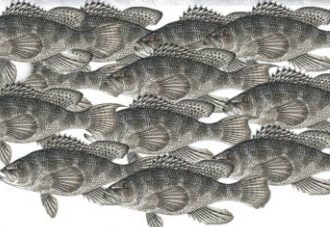
FishNet-USA – What do you do with it?
A message from Nils Stolpe – I know that a lot of commercial fishing industry people receive FishNet-USA, but I don’t have a solid handle on what gets done with it after it’s received. I hope that you all read it. I know that some of you do because I’ll get an email or two after every issue complimenting me on it, but I don’t have much of an idea what happens after that. Accordingly I’ve put this note together to let you know what I think you should do with it after you read it – assuming that you agree with at least some of what I’ve written, and that you’d like to have other folks read it. click here to read the recommendations 08:25 

Time to get enviro groups off taxpayer gravy train
EPA Administrator Scott Pruitt recently issued a directive to end a 20-year string of “sue and settle” cases that have funneled untold millions of tax dollars to environmental organizations. Predictably, those groups and their allies have been apoplectic about it. Many of these groups have grown from grassroots citizen movements to gigantic cash-flush conglomerates, with much of the cash coming from the government they appear or pretend to be fighting. Many now have separate legal arms with hundreds of attorneys, whose primary job is to sue the government and keep the cash flowing. They are part of the $13-billion-per-year U.S. environmental industry and lobby. click here to read the story 15:43

Lets meet and build a consensus to have Congress enact a U.S. Fisheries Bill – Sam Parisi
I am a retired fisherman and am very concerned about the fishing future for those who are still engaged in their chosen occupation, and want to devote my time to help protect the future of those that are still fishing. As you know we are faced with many obstacles. I thought we could together fix the problems but there are so many, and the problems continue increasing. From National Marine Monuments closures, forced monitoring costs on those that can’t afford them, allocation cut backs based on science no one has confidence in unless you work for the NOAA, and now a steady wave of industries that want to utilize our traditional fishing grounds along every coast line of the EEZ. click here to read the letter 15:48
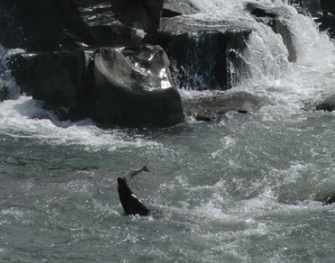
Dwindling winter steelhead are on their own again at Willamette Falls
With the first four dozen winter steelhead counted at Willamette Falls and scattered early catches reported in both the Clackamas and Sandy rivers, Oregon scientists, fish managers, anglers and others must helplessly hold their figurative breath. Sea lions, which chewed through as much as 25 percent of the dismal return of 2016-17 steelhead, pretty much have free rein this winter to repeat the carnage. “The impact, if left un-managed, will be pretty devastating,” said Shaun Clements, senior fish division policy advisor for the Oregon Department of Fish and Wildlife. click here to read the story 16:11
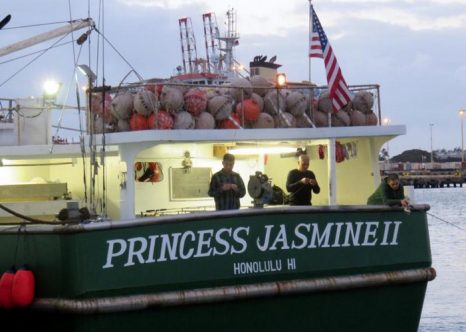
Bill introduced allowing Hawaii’s foreign fishermen onshore
Hundreds of foreign fishermen currently confined to vessels in Honolulu for years at a time would be allowed to come ashore when they dock under legislation introduced Thursday in Congress. The Sustainable Fishing Workforce Protection Act offers workplace protections a year after an Associated Press investigation found that Hawaii’s commercial fishing fleet is crewed by about 700 men who are never allowed off their boats, even when they come into the Honolulu Harbor to unload their catch. Sen. Mazie Hirono, “This bill provides necessary protections for foreign fishermen and ensures the continued viability of Hawaii’s longline fishing fleet, which is important to our culture,” click here to read the story 11:24

‘Time is of the essence’: California Fisheries face uncertainty
State regulators and fishing officials said at a Eureka hearing on Friday that only by working together can they overcome the trials and uncertainty that several California’s fisheries face today. With a poor salmon catch in 2017 and 2016 and a potential delay in the North Coast Dungeness crab season following three years of poor landings and abnormal ocean conditions, Pacific Coast Federation of Fishermen’s Associations Executive Director Noah Oppenheim said fishing fleets are still feeling the economic effects and that time to address the underlying issues is running slim. click here to read the story 08:46
Congress wants to ban the shark fin trade. These scientists think that’s a bad idea.
 Florida has a few more days until increased shark fin penalties kick in, and Congress is considering a ban that would prohibit fin sales for the entire country. But a paper co-authored by two shark researchers argues that such a ban would be destructive to shark fisheries management tactics already in place. The act of cutting off a shark’s fin and dumping its body into the water, eventually leading it to bleed to death or suffocate, has been illegal in the U.S. since 2000. Senate Bill 884 increases the fines for those who cut the fins off sharks while on the water, or return to shore with a shark’s fin separated from its body. While Mote Marine Laboratory’s Robert Hueter supported Florida’s new law imposing stricter fines for finning, he said Congress aims to solve a problem that doesn’t exist in the U.S. click here to read the story 08:33
Florida has a few more days until increased shark fin penalties kick in, and Congress is considering a ban that would prohibit fin sales for the entire country. But a paper co-authored by two shark researchers argues that such a ban would be destructive to shark fisheries management tactics already in place. The act of cutting off a shark’s fin and dumping its body into the water, eventually leading it to bleed to death or suffocate, has been illegal in the U.S. since 2000. Senate Bill 884 increases the fines for those who cut the fins off sharks while on the water, or return to shore with a shark’s fin separated from its body. While Mote Marine Laboratory’s Robert Hueter supported Florida’s new law imposing stricter fines for finning, he said Congress aims to solve a problem that doesn’t exist in the U.S. click here to read the story 08:33
No West Coast fishery relief funds again in Congress’ $1.2T spending bill
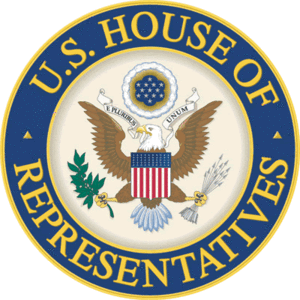 For Yurok Tribe member Sammy Gensaw III, the divide between Capitol Hill and his hometown of Requa on the mouth of the Klamath River is measured in more than miles. The tribe and commercial fishermen across the West Coast learned this past week that the House of Representatives once again did not include fishery disaster relief funds in a $1.2 trillion spending bill it approved. The relief funds would aid fishermen who suffered major losses after the disastrous 2015-2016 crab season and 2016 salmon season. This year’s salmon season was even worse, with the forecast return of Klamath River Chinook salmon being the lowest on record. click here to read the story 10:22
For Yurok Tribe member Sammy Gensaw III, the divide between Capitol Hill and his hometown of Requa on the mouth of the Klamath River is measured in more than miles. The tribe and commercial fishermen across the West Coast learned this past week that the House of Representatives once again did not include fishery disaster relief funds in a $1.2 trillion spending bill it approved. The relief funds would aid fishermen who suffered major losses after the disastrous 2015-2016 crab season and 2016 salmon season. This year’s salmon season was even worse, with the forecast return of Klamath River Chinook salmon being the lowest on record. click here to read the story 10:22
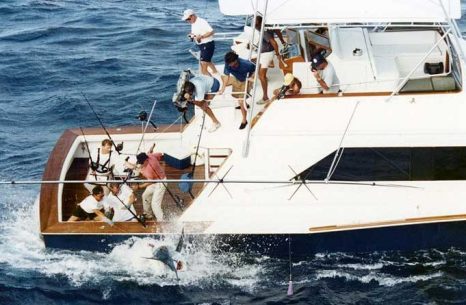
Modern Fish Act: boon to recreational fishing or risk to U.S. fishery?
The Magnuson-Stevens Fishery Conservation and Management Act sets strict, scientifically adjusted, annual catch limits on U.S. commercial, charter and recreational fisheries in order to sustain saltwater fish stocks, and is seen as a model of fishery management globally. The Modern Fish Act (MFA), a bill introduced in the U.S. House in April, would do away with limits on recreational fishermen, who argue they have no impact on fishery stocks. Environmentalists, however, say the MFA introduces legal loopholes that would allow for uncontrolled fishing at potentially unsustainable levels that could cause stocks to crash. Critics also say that the MFA muddies the waters between federal and state management, and allows political and economic considerations to override science in management decisions. The bill is still moving through Congress, and its chances for passage are presently unknown. click here to read the story 08:55
Congress Picks Sides on Trump Plan to Expand Offshore Drilling
 President Donald Trump’s plan to expand offshore oil drilling spurred dueling letters from members of Congress last week, 118 of whom say the plan is critical for U.S. energy security, while 69 others doubt it — plus nearly 18,000 letters of public comment, most of them opposing expanded drilling. Only 6 percent of the U.S. Outer Continental Shelf is available for leasing to oil and gas drillers from 2017 to 2022, under a drilling plan completed in the final days of President Barack Obama’s presidency. The shelf is 1.7 billion acres of submerged federal land from 3 nautical miles off the coastline, state-regulated waters, to 200 nautical miles out. click here to read the story 11:06
President Donald Trump’s plan to expand offshore oil drilling spurred dueling letters from members of Congress last week, 118 of whom say the plan is critical for U.S. energy security, while 69 others doubt it — plus nearly 18,000 letters of public comment, most of them opposing expanded drilling. Only 6 percent of the U.S. Outer Continental Shelf is available for leasing to oil and gas drillers from 2017 to 2022, under a drilling plan completed in the final days of President Barack Obama’s presidency. The shelf is 1.7 billion acres of submerged federal land from 3 nautical miles off the coastline, state-regulated waters, to 200 nautical miles out. click here to read the story 11:06
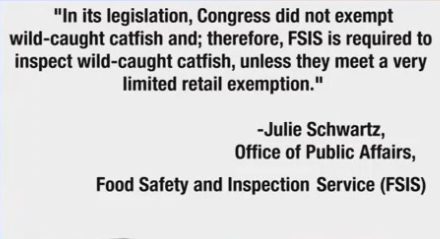
New Blue Catfish Regulation Threatening Health of Chesapeake Bay and Business
The blue catfish is putting up quite the fight and it’s making Delmarva crabbers like Ryan Crouch frustrated. A new federal regulation will make it harder for those who catch blue catfish to sell them. The more catfish caught – the better off the crab population and the livelihoods of the watermen who catch them. The regulation, which goes into effect in September, requires watermen to hire an inspector before the fish can be sold. Watermen like Crouch and business owners like Joe Spurry Jr. of Bay Hundred Seafood are fighting this new regulation. They say the more catfish out of the bay, the more crabs there are to catch. click here to read the story 10:02
Legislative Bills would open red snapper harvest out to at least 25 miles
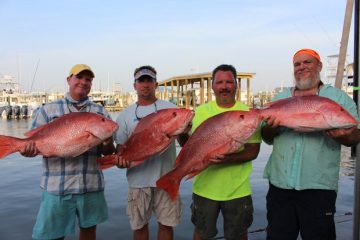 Louisiana senators and representatives have introduced companion legislation in Congress that would give states management authority of red snapper out to 25 miles or 25 fathoms, whichever is greater, off their coastlines. Currently, states control red snapper out to nine nautical miles. Both Louisiana senators, Bill Cassidy and John Kennedy, introduced the bill in the Senate, while Reps. Garret Graves, Cedric Richmond and Clay Higgins joined seven other representatives to propose the House bill. The legislation is designed to ensure Gulf of Mexico anglers have broader access to rebounding red snapper stocks during 2018 and beyond. This year, the Commerce Department gave recreational anglers 39 additional days in federal waters after NOAA Fisheries set a three-day recreational season. That move is being contested in court, and without legislation to address the issue, recreational anglers could be locked out of the fishery in 2018. click here to read the story 16:01
Louisiana senators and representatives have introduced companion legislation in Congress that would give states management authority of red snapper out to 25 miles or 25 fathoms, whichever is greater, off their coastlines. Currently, states control red snapper out to nine nautical miles. Both Louisiana senators, Bill Cassidy and John Kennedy, introduced the bill in the Senate, while Reps. Garret Graves, Cedric Richmond and Clay Higgins joined seven other representatives to propose the House bill. The legislation is designed to ensure Gulf of Mexico anglers have broader access to rebounding red snapper stocks during 2018 and beyond. This year, the Commerce Department gave recreational anglers 39 additional days in federal waters after NOAA Fisheries set a three-day recreational season. That move is being contested in court, and without legislation to address the issue, recreational anglers could be locked out of the fishery in 2018. click here to read the story 16:01
Oregon, Washington and tribes again take aim at sea lions in dispute over salmon
 Congress is once again considering giving Oregon and Washington fish and wildlife officials and regional tribes broader authority to kill sea lions below the Bonneville Dam, an effort supporters say is necessary to protect 13 endangered species of salmon and steelhead. But unlike previous attempts to rein in the marine mammals, which are protected under federal law, the legislation goes beyond killing the dozens that converge each spring on the fish logjam at the Columbia River dam 145 miles from the Pacific Ocean. The bipartisan team behind the bill — Reps. Jaime Herrera-Beutler, R-Washington, and Kurt Schrader, D-Oregon — want to go much further. They also want to make it easier to kill California sea lions found on the Willamette River and its tributaries, and anywhere on the Columbia River east of Interstate 205. If the legislation is approved, as many as 920 sea lions could be killed annually, compared with 92 under current law. click here to read the story 08:54
Congress is once again considering giving Oregon and Washington fish and wildlife officials and regional tribes broader authority to kill sea lions below the Bonneville Dam, an effort supporters say is necessary to protect 13 endangered species of salmon and steelhead. But unlike previous attempts to rein in the marine mammals, which are protected under federal law, the legislation goes beyond killing the dozens that converge each spring on the fish logjam at the Columbia River dam 145 miles from the Pacific Ocean. The bipartisan team behind the bill — Reps. Jaime Herrera-Beutler, R-Washington, and Kurt Schrader, D-Oregon — want to go much further. They also want to make it easier to kill California sea lions found on the Willamette River and its tributaries, and anywhere on the Columbia River east of Interstate 205. If the legislation is approved, as many as 920 sea lions could be killed annually, compared with 92 under current law. click here to read the story 08:54




































